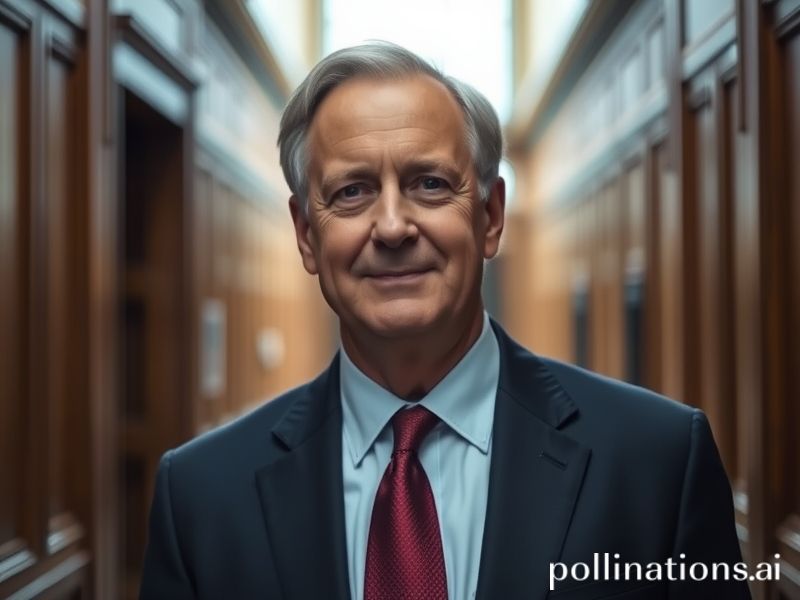Peter Kyle: The Accidental Global Sheriff of the Internet Age
Peter Kyle and the Great British Firewall: How One Minister Accidentally Became the World’s Most Reluctant Cyber-Czar
By Dave’s Locker International Desk
Somewhere between the second flat white and the third existential crisis of a Wednesday, Peter Kyle—the UK’s Secretary of State for Science, Innovation and Technology—found himself promoted from obscure MP for Hove to the planet’s de-facto referee in the geopolitical cage-match known as “Who Gets to Break the Internet Today?”
It began innocently enough. Tasked with ushering the Online Safety Act from campaign-trail bumper sticker to enforceable legislation, Kyle inherited a bill that was already the legislative equivalent of a Swiss Army knife welded to a sledgehammer: every vested interest, from Silicon Valley lobbyists to Fleet Street’s last surviving editors, had jammed in their favourite blade. The stated mission was to protect British children from digital bogeymen; the subtext was to convince 195 other countries that the United Kingdom could still write rules the rest of the globe might voluntarily obey—an ambition roughly equivalent to teaching corgis to herd satellites.
Cue the international ripple effect. In Brussels, officials at the European Commission opened celebratory bottles of Orval and quietly copied large chunks of the Act’s homework, relabeling it “Digital Services Act 2: Electric Boogaloo.” Meanwhile, authoritarian regimes from Caracas to Astana sent Kyle thank-you notes for providing rhetorical cover: “See, even the mother of parliaments believes in pre-emptively scanning private messages!” Civil-liberties NGOs responded by updating their annual reports to include the new category “UK-grade surveillance envy.”
The Americans, naturally, took the mature route. Elon Musk tweeted a meme of Kyle as a Victorian chimney sweep captioned “This guy wants to regulate your DMs,” and Meta’s policy team threatened to pull Instagram filters from the UK market—an act of retaliation that would have ruined brunch for approximately 14 million Britons and, oddly, improved national self-esteem. Over in Washington, senators asked whether Britain’s insistence on “backdoors” might weaken global encryption, apparently forgetting their own twenty-year quest for the digital skeleton key labelled “Patriot Act—Do Not Duplicate.”
Yet the cosmic joke runs deeper. Kyle, a man who once confessed he still uses a paper Filofax, now finds himself lecturing quantum-cryptography start-ups in Seoul on “responsible innovation.” His diary, leaked by someone who presumably enjoys watching civil servants hyperventilate, shows 17 back-to-back meetings in three time zones, including a 4 a.m. Zoom titled “Explaining End-to-End Encryption to the Australian Deputy PM Without Using Hand Puppets.” The poor man has become a living metaphor for late-stage capitalism: simultaneously overworked, under-qualified, and blamed for everything from teenage screen addiction to the declining birth-rate of European songbirds.
Global markets, ever allergic to nuance, have reacted in predictable fashion. Shares in British VPN providers surged 300%. Costa Coffee reported record profits after installing “privacy booths” for clandestine doom-scrolling. And somewhere in the Cayman Islands, a hedge fund is already shorting the concept of “digital sovereignty,” wagering that nation-states will eventually tire of pretending they can out-code a bored 17-year-old in Tallinn.
What happens next is anyone’s guess. The Act’s enforcement clause—Section 183, subsection (f), paragraph iii, affectionately nicknamed “The Voldemort Provision”—allows Ofcom to fine tech CEOs up to 10 percent of global turnover, a threat roughly as credible as asking James Bond to babysit your goldfish. Still, the symbolism counts. By Christmas, expect souvenir T-shirts in Shibuya reading “I visited the UK and all I got was this lousy content moderation.”
And so, as COP 29 delegates argue over carbon while burning jet fuel, and the IMF debates debt relief on a spreadsheet that still runs Excel 2007, Peter Kyle soldiers on: part scapegoat, part accidental trend-setter, wholly unprepared for the moment when history books reduce him to a footnote titled “The Man Who Tried to Make the Internet Polite—And Succeeded Only in Making It British.”
In the grand theatre of global governance, that may be the darkest joke of all.







